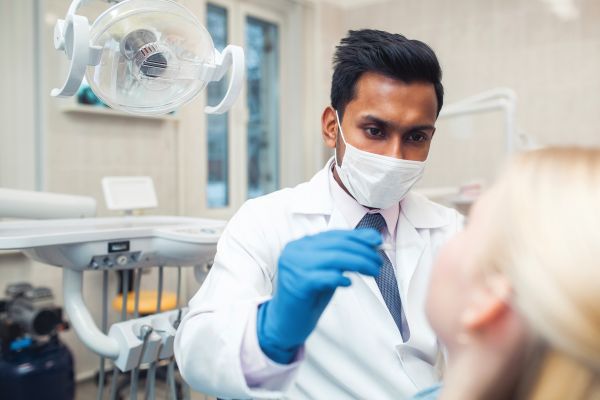A general dentist has a wealth of knowledge, not only about oral health but also about health issues that may affect or threaten oral health. Osteoporosis, for example, is a condition that weakens bones in the body. The health of our teeth depends on a variety of factors, including dental hygiene, hereditary tooth structure and even seemingly unrelated health problems throughout the body.
What is osteoporosis?
Osteoporosis is a condition that affects the bones, weakening them and making them easily breakable. It is characterized by low bone mass and structural deterioration of bone tissue. The body is constantly absorbing and replacing bone tissue, but with osteoporosis, the creation of new bone does not fully replace old bone. Unfortunately, the condition is widely undetectable until a fracture occurs.
Who is at risk for osteoporosis?
Women are twice as likely to develop osteoporosis, but only by a relatively small margin. The areas most affected by osteoporosis are the hip, spine and wrist, but any bone in the body can be affected. The condition mostly affects patients over the age of 40, but cases have been reported as young as 14. Even though this is a medical condition, a general dentist will have knowledge about the way it affects the teeth.
Osteoporosis and your teeth
Although osteoporosis does not affect the teeth directly, it can target the jawbone. Specifically, it affects the part of the jawbone that supports the teeth. When the jawbone is compromised, the sufferer may start to experience an increased frequency of dental issues.
Jawbone loss is likely to cause tooth loss and loosened teeth. Gum recession can occur as well. When the teeth are unsupported, they begin to loosen. The gum has less to hold onto, so it begins to recede due to disuse. As a result of this gum recession, the teeth can become more susceptible to decay and the gums more prone to gum disease. The vicious cycle continues until tooth loss occurs.
In addition to making an appointment with a general dentist to get to the root of these issues, there are ways to control and even prevent the progression of the condition.
How to avoid teeth issues associated with osteoporosis
Give your teeth the best fighting chance by first implementing a diligent oral hygiene routine. Daily brushing and flossing needs to be a top priority when you are diagnosed with osteoporosis if you want to avoid teeth problems. Regular professional dental cleanings will also help. Your general dentist will be able to work with you and come up with an action plan to treat teeth issues related to osteoporosis.
A diet rich in calcium and vitamin D can lessen the effects of osteoporosis on dental health. Vitamin D also helps in preventing infections of the mouth tissue, like gum disease. For some women, estrogen may even be a valuable treatment for dental health problems associated with osteoporosis.
Let's get started …
Request an appointment here: https://drsykes.com or call Robert S. Sykes, DDS at (770) 873-7241 for an appointment in our Marietta office.
Check out what others are saying about our services on Yelp: Read our Yelp reviews.
Related Posts
Is it Painful to Get a Tooth Implant?
Tooth implants have become a popular replacement option for individuals with missing teeth. Also known as dental implants, this replacement option is one that requires a semi-invasive oral surgery. The term oral …
Complications To Watch for After a Tooth Extraction
Complications after a tooth extraction are uncommon, but understanding the warning signs helps protect long-term oral health. During healing, problems such as infection, dry socket, or prolonged bleeding can occasionally develop. Knowing …
Denture Repair: What to Do When Your Partial Dentures Break
A denture repair is needed when a set of dentures becomes damaged. Damage can occur from simply dropping the appliance or even eating something too hard that may produce a crack or …
Take-Home Teeth Whitening Trays: A Convenient Way to Improve Your Smile
Teeth whitening works by applying a peroxide gel that lifts stains from enamel, the tooth’s outer layer. Custom trays hold the gel evenly against the teeth, promoting consistent shade change while limiting …






